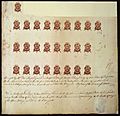Stamp Act 1765 facts for kids

|
|
| Long title | An act for granting and applying certain stamp duties, and other duties, in the British colonies and plantations in America, towards further defraying the expenses of defending, protecting, and securing the same; and for amending such parts of the several acts of parliament relating to the trade and revenues of the said colonies and plantations, as direct the manner of determining and recovering the penalties and forfeitures therein mentioned. |
|---|---|
| Citation | 5 George III, c. 12 |
| Introduced by | The Right Honourable George Grenville, MP Prime Minister, Chancellor of the Exchequer, and Leader of the House of Commons |
| Territorial extent |
|
| Dates | |
| Royal assent | 22 March 1765 |
| Commencement | 1 November 1765 |
| Repealed | 18 March 1766 |
| Other legislation | |
| Repealed by | Act Repealing the Stamp Act 1766 |
| Relates to | Declaratory Act |
|
Status: Repealed
|
|
The Stamp Act of 1765 was a law passed by the British Parliament in 1765. This law said that many printed materials in the American colonies had to have a special stamp. Things like newspapers, legal documents, and playing cards needed these stamps. To get a stamp, people had to pay a tax in British money.
The main reason for this new tax was to help pay for British soldiers. These soldiers were stationed in North America after Britain won the Seven Years' War and the French and Indian War. The British government felt the colonies should help pay for their own protection.
Contents
What Was the Stamp Act?
The Stamp Act was a new kind of tax for the American colonies. Before this, taxes were usually on trade, like goods coming into ports. This new tax was on things made and used inside the colonies. This made many colonists very upset.
Why Did Britain Create This Tax?
After the French and Indian War, Britain had a lot of debt. They also needed to keep soldiers in America to protect the colonies. British leaders believed the colonists should help pay for these costs. Prime Minister George Grenville suggested the Stamp Act.
What Items Needed Stamps?
Many everyday items and important documents needed a stamp.
- Newspapers and pamphlets
- Legal documents like contracts and wills
- Playing cards and dice
- Almanacs and calendars
- College diplomas
Each stamp showed that the tax had been paid.
Why Colonists Were Angry
The Stamp Act caused a huge uproar in the American colonies. Colonists felt it was unfair for several reasons.
No Taxation Without Representation
This became a famous slogan. Colonists argued that they should not be taxed by the British Parliament because they did not have representatives there. They believed only their own colonial assemblies could tax them. This idea was a core belief for many colonists.
Economic Impact on Colonists
The tax had a big impact on businesses and ordinary people. Lawyers, printers, and merchants were especially affected. The tax had to be paid in British currency, which was often hard to get in the colonies. This made it even more difficult for people to afford the stamps.
How Colonists Responded
The colonists did not just complain; they took action. Their protests were strong and widespread.
Boycotts and Protests
Many colonists refused to buy British goods. This was called a boycott. They hoped that hurting British trade would make Parliament change the law. People also held public protests and demonstrations.
Sons of Liberty
Groups like the Sons of Liberty formed to organize resistance. They sometimes used strong methods, like threatening stamp distributors. Some stamp agents were forced to resign from their jobs.
Stamp Act Congress
In October 1765, representatives from nine colonies met in New York City. This meeting was called the Stamp Act Congress. They wrote a declaration stating that Parliament could not tax the colonies without their consent. This was an important step towards colonial unity.
Repeal of the Stamp Act
The protests and boycotts had a big effect. British merchants lost money because colonists stopped buying their goods.
Why Britain Changed Its Mind
British businesses pressured Parliament to repeal the act. They were losing too much money. Also, the protests in the colonies were becoming very intense. On March 18, 1766, Parliament officially repealed, or canceled, the Stamp Act.
The Declaratory Act
However, on the same day, Parliament passed another law called the Declaratory Act. This act stated that Parliament had the full power to make laws for the colonies "in all cases whatsoever." While the Stamp Act was gone, the Declaratory Act showed that Britain still believed it had the right to tax the colonies. This would lead to more problems later on.
Legacy of the Stamp Act
The Stamp Act was a short-lived law, but it had a lasting impact. It showed the colonists that they could unite and challenge British authority. It also made many colonists think more deeply about their rights and their relationship with Britain. This event helped set the stage for the American Revolution.
Images for kids
-
A painting of British Prime Minister George Grenville
-
Benjamin Franklin represented Pennsylvania in discussions about the act.
-
A 1765 broadside regarding the resignation of Andrew Oliver under the Liberty Tree
See also
 In Spanish: Ley del sello para niños
In Spanish: Ley del sello para niños











